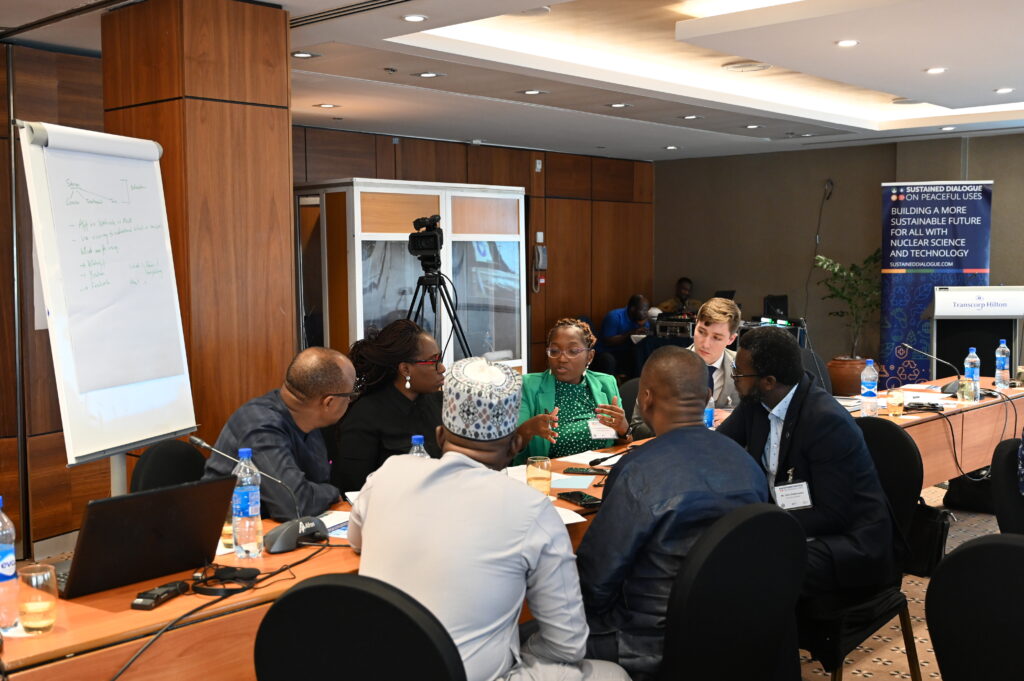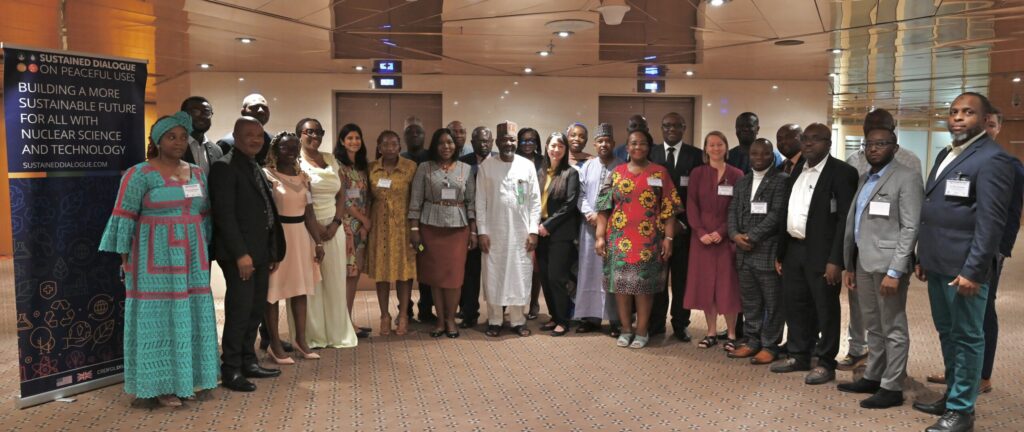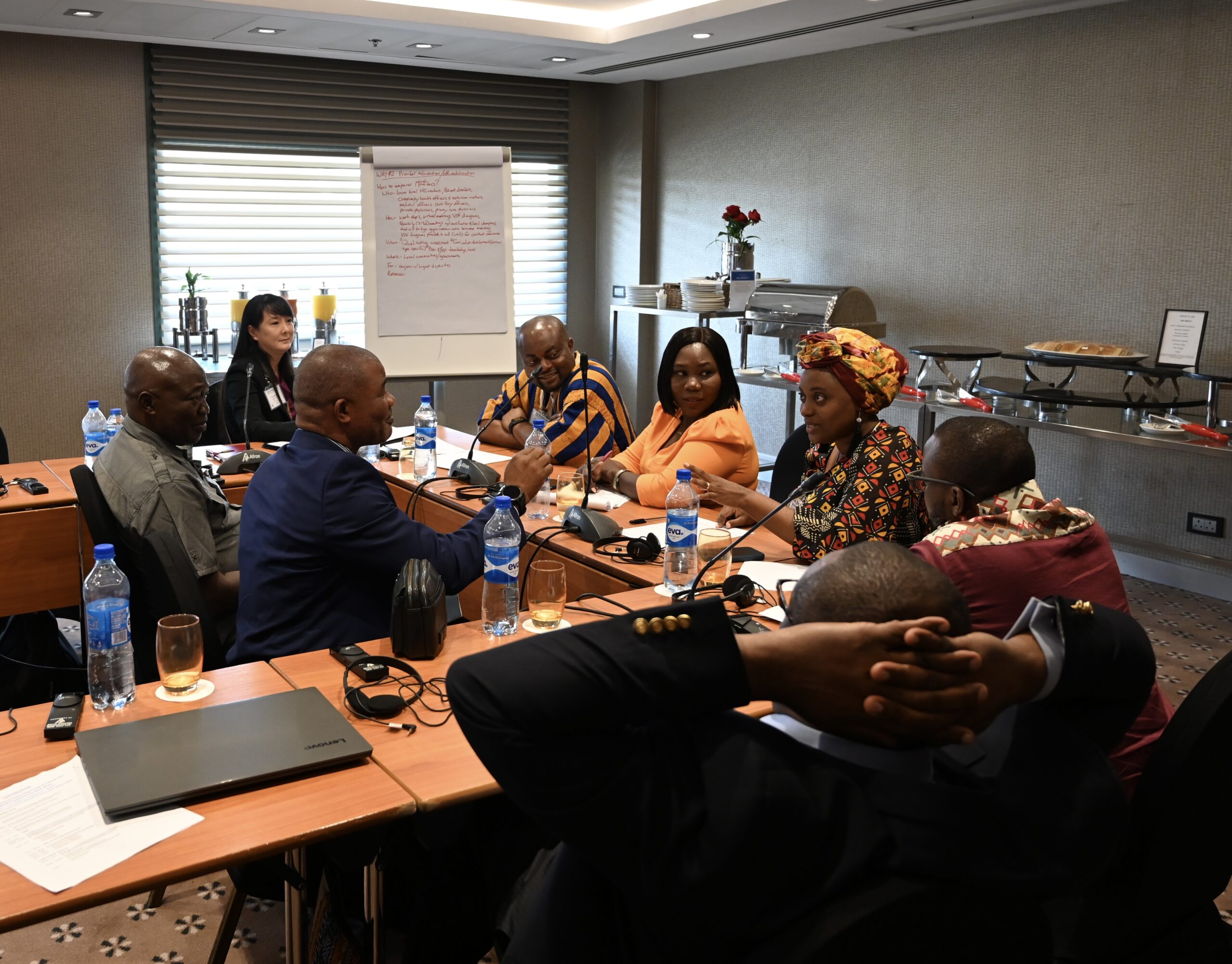Trilateral Meeting on Improving Access to Cancer Care for Rural Populations in West Africa
Executive Summary
This report summarizes the two-day dialogue titled, “Trilateral Meeting on Improving Access to Cancer Care for Rural Populations in West Africa” held on February 29 – March 1, 2024, at the Transcorp Hilton in Abuja, Nigeria. The meeting brought together health experts from Ghana, Cameroon, and Nigeria, including Ministries of health, NGOs, public and private sectors of clinical leadership, and other global experts such as the International Atomic Energy Agency (IAEA), the U.S. National Cancer Institute (NCI), the American Society of Clinical Oncology (ASCO), and City Cancer Challenge (C/CAN). The meeting was an opportunity for focused discussions to identify key challenges in access to cancer care in rural areas and existing programs that are addressing these challenges. The meeting concluded with a rich discussion on practical, high-impact actions that could be taken to support improved access to cancer care for rural populations. Potential areas of work include: improving provider and public education through collaboration with faith-based organizations, community leaders, and traditional healers; enabling remote follow-ups with patients by utilizing Unstructured Supplementary Service Data (USDD); raising awareness of available educational opportunities available for cancer physicians and primary care physicians to train in cancer care; and sharing these opportunities through forums such as the African Organization for Research and Training in Cancer (AORTIC).
Keywords: Healthcare Access, Oncology, West Africa, Global Health Partnerships, Nuclear Technology, Peaceful Uses, UN Sustainable Development Goals, SDG3 – Good Health and Well-Being

In a breakout group session, healthcare experts from Cameroon, Ghana, and Nigeria were joined by a member of the U.S. Department of Energy to discuss technological solutions to cancer care access.
Introduction
This report documents and promotes the practical recommendations developed by experts at the SDPU “Trilateral Meeting on Improving Access to Cancer Care for Rural Populations in West Africa,” reflecting the collective efforts of a distinguished group of healthcare professionals, patient advocates, and other stakeholders to identify key challenges and opportunities to improve access to cancer care for rural populations. Held under the SDPU initiative, which seeks to promote the peaceful applications of nuclear technologies, this meeting was made possible by the joint efforts of CRDF Global, the IAEA, the Nigerian government, past participants of the Ghana workshop on “Improving Access to Radiation Medicine in West Africa,” and other stakeholders in the medical field. The SDPU program is jointly funded by the US Department of State and the UK Department for Energy Security and Net Zero. Under the SDPU, participants will draw from these outcomes in fostering collaboration among governments, international organizations, and additional stakeholders to tackle challenges that impede access to rural cancer medicine in West Africa and improve access to cancer care globally. The SDPU initiative aims to support the development of new or existing efforts, fostering a robust and inclusive healthcare ecosystem.
In the summer of 2023, the SDPU hosted the workshop series on “Improving Access to Radiation Medicine in West Africa,” convening roughly 100 participants from over ten countries in Ghana to hold focused discussions on addressing challenges to access to cancer care in West Africa. During these discussions, participants identified three key priority areas to increasing access to radiation medicine: improving equipment maintenance, optimizing workflow and patient experience, and strengthening systems in radiation medicine. Discussions on key issues and possible solutions for improving equipment maintenance and optimizing workflow and patient experience progressed quickly at the Ghana workshop. Participants also requested further focused discussions on Strengthening Systems in Radiation Medicine, emphasizing the importance of improving awareness, access, and affordability, and specifically highlighted lack of access to cancer treatment and care in rural areas, as areas for further discussion. As an outcome of the Ghana workshop, participants proposed a further dialogue to specifically address access to rural cancer medicine and share information on:
- Current national and international programs, policies, and plans for rural outreach and visiting specialists’ services.
- Programs of telemedicine, virtual mentoring, e-visits, and oncology training for primary care physicians.
- Options for improving and strengthening referral systems through forward and backward referral.
- Options for developing and supporting rural outreach services through partnerships and collaboration between and among public, private, and NGOs.
The “Trilateral Meeting on Improving Access to Cancer Care for Rural Populations in West Africa,” held on February 29 – March 1, 2024, in Abuja, Nigeria, aimed to build on these requests and recommendations.
This meeting included several high-level participants, including Director General of the National Institute of Cancer Research and Treatment in Nigeria, Professor Usman Aliyu Malami, Chairman and Chief Executive Officer of the Nigeria Atomic Energy Commission, Professor Yusuf Aminu Ahmed, Advisor to Ghana Minister of Health, Dr. Baffour Awuah, Director for the IAEA’s Program of Action for Cancer Therapy (PACT), Dr. Lisa Stevens, Section Head of the IAEA’s Technical Cooperation Department’s Africa Division (TCAF), Dr. Mickel Edwerd, as well as several key clinical professionals from the public and private medical sector from Ghana, Nigeria and Cameroon. Representatives from ASCO, NCI and C/CAN also attended to share their experiences in addressing challenges to access and provide expert recommendations.
Organizations in Attendance
- U.S. Department of State
- UK Department for Energy Security & Net Zero
- CRDF Global
- International Atomic Energy Agency
- University of Pennsylvania Oncology
- U.S. National Cancer Institute
- U.S. Department of Energy
- Agence Nationale De Radioprotection
- American Society of Clinical Oncology
- Cameroon Oncology Center
- City Cancer Challenge
- General Hospital Douala
- General Hospital of Yaoundé
- Ghana Atomic Energy Commission
- Korle Bu Teaching Hospital
- Medicaid Cancer Foundation
- Ministry of Health of Ghana
- Ministry of Health and Social Welfare of Nigeria
- National Institute for Cancer Research and Treatment
- Nigeria Atomic Energy Commission
- University of Ghana
- University of Lagos

Expert-level participants representing Cameroon, Ghana, and Nigeria pose for a group picture in Abuja, Nigeria.
Topics Discussed
Challenges in rural cancer care in West Africa: To lay the groundwork for this meeting, representatives from Nigeria, Ghana, and Cameroon were invited to share their challenges and experiences in accessing and treating rural cancer patients. While each country individually spoke to their challenges, it quickly became evident there were various overlapping themes including:
- Lack of public education and awareness and high trust in local traditional healers/faith-based medicine over western medicine among rural populations: Due to these challenges, and stigma sometimes associated with a cancer diagnosis, rural patients often do not seek screenings or treatment, limiting healthcare providers’ abilities to reduce the cancer burden in these areas.
- Lack of training of primary care providers (PCPs): PCPs are often the first to see patients and lack training and awareness surrounding early symptoms or indicators of cancer, causing challenges in early detection of cancer and lack of referrals to specialists.
- Lack of implementation of technology to bridge the gap between patients and providers: In addition to lack of accessibility to equipment to treat patients, technological innovations to bridge the gap between patients and providers to monitor patient outcomes and reach individuals that may need treatment are underutilized.
- High costs for travel and housing: Participants highlighted high costs associated with bringing patients from rural settings to cities to receive treatment as a key challenge.
Ongoing initiatives to improve access to cancer care: After discussions on challenges, participants were provided additional information on several existing (or contemporary) initiatives in other parts of Africa that aim to increase access to cancer care; presentations were made by the IAEA, ASCO, and NCI. These presentations were provided to stimulate ideas for addressing similar challenges in West Africa. The IAEA shared information on its Rays of Hope initiative and Programme of Action for Cancer Therapy (PACT), which helps integrate radiation medicine into comprehensive cancer control plans and provides support for technical assessments, resource mobilization, and partnerships to build cancer care capacity in participating states. ASCO shared its initiatives focused on using the training-the-trainer model, which seeks to train primary care workers in cancer care and palliative medicine. Additionally, ASCO presented on its pediatric oncology fellowship that was developed in Egypt in collaboration with ASCO and Boston Children’s Hospital. NCI shared their support for the application of new technologies for global cancer control through the Affordable Cancer Technologies (ACTs) program and the FIC-led Mobile Health Technology and Outcomes in low-and-middle-income countries (LMICs) program.
Potential high impact actions to improve access to cancer care for rural populations in West Africa: After discussions on the challenges in rural cancer care in West Africa and ongoing initiatives to improve access, participants delved into a focused discussion on high priority areas to address access to cancer care in rural populations, which included: public education, PCP education and training, and technology solutions to support public and provider education. Participants were divided into three groups to develop and recommend potential action items that can be used to improve access to cancer care for rural populations for each priority area. More information on these recommendations can be found in the recommendations section of this report.
Any Other Business: Though not directly related to the focus of this meeting to improve access to cancer care for rural populations in West Africa, participants acknowledged that training for cancer care specialists is also critical to maintaining overall access to cancer care. Participants emphasized a need to raise awareness of educational initiatives available for oncology trainees, junior faculty, and primary providers and make them available on cancer organization websites and present them at forums (e.g. AORTIC). Several training opportunities were discussed such as gynecological radiation training program through International Gynecologic Cancer Society (IGCS), IAEA training programs, training opportunities through vendors and pharmaceutical companies, professional societies such as ASCO, European Society for Medical Oncology (ESMO) and European Society for Radiotherapy and Oncology (ESTRO), and NGOs such as BrachyTerra. Participants noted a need to clarify the process for applying for IAEA training. Time was set aside on the second day of the meeting to review registration on the IAEA’s InTouch+ and NUCLEUS platforms to connect people to training opportunities. Participants suggested a similar session on these IAEA resources at the upcoming 2024 AORTIC conference to increase accessibility to IAEA funding for interested parties.

Cancer care experts representing Cameroon, Ghana, and Nigeria are joined by the U.S. Department of State’s Program Officer Dr. Janet Chen and the International Atomic Energy Agency’s Section Head for Africa Dr. Mickel Edwerd in a breakout group focused on improving provider education.
Themes and Recommendations
Participants agreed on key challenge areas: public education and awareness, training of primary care providers, and implementation of technological advances to monitor and communicate with potential and existing patients. Participants were divided into three focused breakout groups to further discuss challenges and develop recommendations on next steps outlined in the table below.
| OBSERVATION | RECOMMENDATIONS |
| Lack of public education and awareness | Participants proposed to initiate community engagement through coordination between licensed healthcare providers and local leaders (including religious leaders and traditional healers). Coordination with local leaders, whom the community has put their trust in, enables healthcare providers to understand what, how, and where their services would be most effective. One participant shared an ongoing effort to hold continuous meetings and training with local leaders to enhance educational messaging on cancer treatment and care in communities. Engagement with community leaders would also enhance understanding of what mode of technology could be best used to disseminate cancer education messaging. For greater impact, participants emphasized that these focus groups would need to happen at the village level. |
| Lack of training of primary care providers (PCPs) | Participants recommended developing a cancer care curriculum specifically for rural West African PCPs. Participants further recommended this curriculum be implemented along with pre and post assessment tests to improve the capacity of PCPs to identify potential cancer patients and make appropriate referrals. |
| Lack of implementation of technological advances to monitor and communicate with potential and existing patients | Participants proposed the deployment of routine remote symptom monitoring for follow ups with patients by utilizing Unstructured Supplementary Service Data (USSD) for those in rural areas and those who don’t have smart phones. Participants also recommended making this resource available in local languages. |
Participants identified several partnership and funding resources that could support the recommendations listed above, including: NCI research grants, International Foundation of Cancer, and ASCO in the various countries. Furthermore, the small working groups established during the meeting have agreed to continue working together to pursue some of these ideas on expanding cancer care access.
This report was composed by Dr. Surbhi Grover, Director of Global Radiation Oncology at the University of Pennsylvania, with review and contributions from CRDF Global. Please direct questions about this report, the meeting for which it was written, or the SDPU program to sdpu@crdfglobal.org or by submitting a message via the Contact page form.

